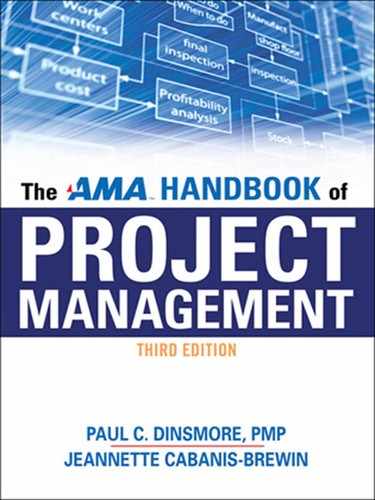Section Two: Introduction
THE PROFESSION OF PROJECT MANAGEMENT
Project management has evolved from the “accidental profession” of years ago—when no one actually planned to become a project manager, but just happened into the position—to a profession based on formalized bodies of knowledge, such as PMI’s PMBOK® Guide and those developed by other professional organizations—the International Project Management Association (Europe) and the Association of Project Managers (UK), among others.
Where once project management was merely an add-on to the role of a civil engineer or systems engineer, today it is more commonly identified as a career choice in and of itself. The rapid growth of the discipline’s primary professional organization—the Project Management Institute—from less than 15,000 members when the first edition of this handbook was published in 1993, to well over a half-million members and credential holders (and increasing) as this book goes to press, gives us a good indication of the rapid “mainstreaming” of the project manager role.
Since formal certification programs appeared in the 1990s, more emphasis has been given to seeing project management as a profession—something that has a defined body of knowledge based on specific principles and is subject to qualifications and knowledge testing based on a formal process. There is an evolving trend toward developing professional certification that is not only knowledge based but also competency based, thus taking into consideration experience records and other formal professional qualifications.
PMI increasingly has focused on certification as the primary benefit to its membership, offering additional targeted certifications, such as the CAPM, designed to be a stepping stone to PMP certification, or a terminal certification for project admin roles, and the PgMP for Program Managers on the more experienced end of the scale.
Many companies require certification for advancement or recognize certification as part of the advancement path in careers. In formal bidding processes for professional services related to projects, client organizations often call for certified project professionals.
The trend toward formal qualification continues to gallop along as professional associations develop more sophisticated certification programs, companies require qualified professionals within their own ranks, and the practitioners of project management strive to sharpen and enhance their craft. Only one organization was offering project management certification in 1993, the Project Management Institute—and only in the English language. Today, at least four significant organizations offer certification in the world, although the Project Management Institute (PMI) continues to be the clear leader in this field with nearly four hundred thousand active certified project managers worldwide.
Professionalism is a personal commitment, but it must be supported by institutions, including professional societies, educational institutions, and the organizations that employ project managers. It also requires a great deal from the individual. The more seriously an occupation is taken as it moves into the category of the professions, the more serious are the implications of unprofessional or unethical behavior on the part of the practitioner.
This section of the handbook focuses on the career of project management. First, what must one do to become a certified Project Management Professional? Theodore Boccuzzi takes us step by step through the various stages of qualification. What are the ethical issues facing project managers? Thomas Mendel, a visiting professor of management at a number of Canadian universities, explores this topic and provides thought-provoking ethical cases for your consideration. Is project management in fact a profession? If not, what must we do to ensure that it becomes one? Professor Janice Thomas addresses these issues. What competencies are required of the project manager, and how are these developed? What does the new project manager have to look forward to in the course of his or her career? J. Kent Crawford and Jeannette Cabanis-Brewin discuss project management competencies and career paths.
